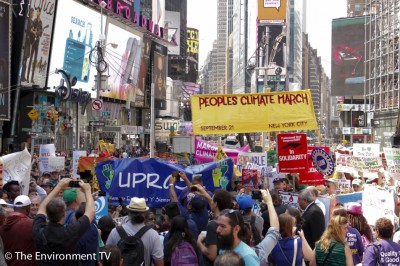
Last weekend, I drove down from Burlington, Vermont with nine other activists from school to participate in the People’s Climate March.
It’s hard to really explain how inspiring the march was. Maybe because it was the march finally showed a side of the environmental movement that we haven’t seen much of yet—a diverse group of activists, united around a common message, making the fight we face political and personal. Maybe the march at one point stretched for 4 miles in midtown Manhattan. Maybe because there were 400,000 protesters, and not a single reported arrest.
Tens of thousands around the world took part in solidarity marches, from Bolivia to Australia. There was even a solidarity rally at school, as a sendoff to those who went down to NYC.
The march took place two days before today’s UN climate summit, a massive show of support for worldwide climate action. What was incredible about the march was the energy—seeing so many people fired up about climate activism! The march brought together indigenous communities, food justice advocates, students and labor groups, children and families. Many of us from UVM marched with students from universities around the country, which naturally included other students organizing for fossil-fuel divestment.
At 12:58, the entire crowd was silent to honor those who have died as a result of climate change, followed by a roar of outrage that came from the back of the march and built until we were all screaming and stamping.
While we marched, it was impossible to resist comparing the march to other mass protests in US history. My mother’s family were organizers in the early 20th century (Jewish socialists, what else?) and encouraged their children to be political and take part in social activism; my grandmother marched with my aunt in the March on Washington in 1963 (allowing her to skip school) and my parents brought me with them to the February 15th protest against the Iraq War in 2003*. As a student, an American, an activist and, yes, as a Jew, dissent is one of the ways to participate in society.
We protesters might have returned to Burlington in the wee hours of the night, exhausted and with shredded vocal chords, but it was worth it to be a part of something so awesome.
*The largest protest in NYC before the People’s Climate March, and before the Arab Spring it was the largest protest in history.
Jesse L. Baum is a student at the University of Vermont.

